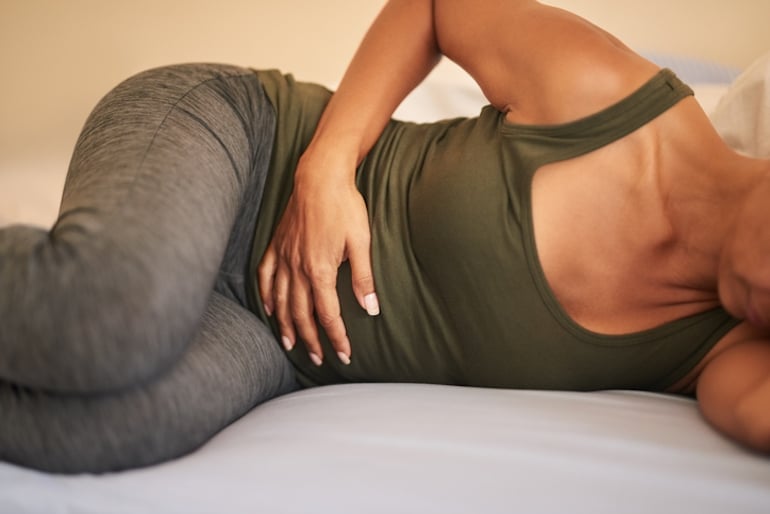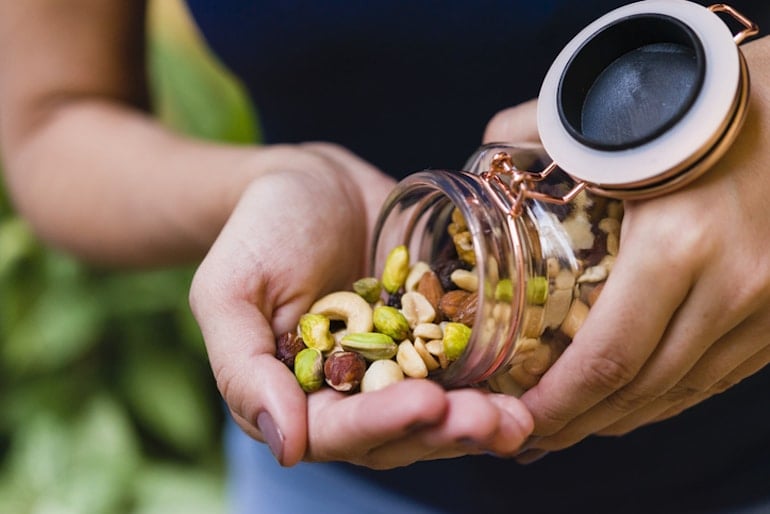Medically Reviewed By
Gaby Vaca-Flores, RDN, CLE
Registered Dietitian Nutritionist
Chelsey Amer, MS, RDN, CDN, teaches us everything to know about constipation, including its causes. Plus: how to relieve constipation with dietary changes and home remedies.
If you’ve ever struggled with bowel irregularity, you know that constipation is no walk in the park. As a dietitian, I frequently talk about bowel habits with clients. These conversations can make people feel awkward, especially when it comes to irregularity and discomfort. However, it’s important to explore this typically taboo topic.
If you’re backed up, know that you’re not alone. It’s estimated that nearly 20 percent of the general population suffers from this common gastrointestinal disorder, with women suffering more often than men.



What is constipation?
Constipation is formally defined as a “difficult or rare passage of stool.” This can lead to painful evacuation with hard or stiff stools. You may also feel bloated, sluggish, or uncomfortable, with cramping. Infrequent bowel movements can even impact your mood. Some studies show that mood disturbances are higher in individuals suffering from constipation. There’s no set quantitative definition for constipation, and there’s a wide range for what constitutes “normal” bowel habits. Normal can range from going to the bathroom a few times daily to a few times weekly. If you feel backed up and your bowel habits are slow, you may be constipated.
What causes constipation?
There are many reasons why you may be constipated. Here are the most common causes of constipation.Not Enough Fiber
A low-fiber diet is a common culprit of constipation. Fiber is a non-digestible carbohydrate found in beans, lentils, vegetables, fruit, whole grains, and more. Fiber adds bulk to your stool and keeps it moving through your digestive tract. Most Americans don’t consume the Recommended Daily Allowance (RDA) of fiber each day. At minimum, men should aim to consume 30 to 38 grams of fiber per day, while women should consume 25 grams of fiber daily.Inadequate Hydration
Even further, a low-fiber diet coupled with inadequate water intake can significantly contribute to constipation. Sixty percent of your body is made of water, so adequate hydration is crucial for your health, beauty, and bowels alike. Specifically, inadequate water intake can make defecating difficult with the hard, painful, and rigid passage of stools.Sedentary Lifestyle
Your binge-watching habits may also increase your chances of being constipated. Why? A sedentary lifestyle can lead to sedentary bowels. Conversely, regular exercise helps keep things moving throughout your gastrointestinal system.Microbiome Health
Furthermore, the health of your microbiome (the billions of bacteria that live in your gut) contributes to your risk of constipation. If the balance of good versus bad bacteria in your gut gets skewed, your bowels may stall.Additional Causes of Constipation
Other causes of constipation include:- older age
- pregnancy
- genetics
- certain medications
- underlying medical issues, such as irritable bowel syndrome (IBS), musculoskeletal injuries, and the anatomy of your gastrointestinal system

How to Relieve Constipation Through Diet
Luckily, there are many ways to help constipation. First, focus on new nutrition by following these dietary tips to get regular.Eat More Fiber
Looking for the best foods for constipation? For starters, get more fiber in your diet! Increase your fiber intake by eating more plant-based foods, including vegetables, fruit, whole grains, beans and legumes. Here are a few simple swaps to reach your recommended daily fiber intake:- At most meals, fill half of your plate with vegetables. Make it fun by trying a new veggie-heavy recipe or pairing vegetables with a delicious dip.
- Focus on soluble fibers like beans, apples, oat bran, barley, and seeds.
- Swap in whole grains for refined white grains. Doing so can add over three grams of fiber to your meal.
Stay Hydrated
While you increase your fiber intake, it’s also essential to sip water regularly. Fiber bulks up your stool, so without water, your stool can become hard and get stuck in your colon. Aim to drink half of your body weight in ounces of water everyday.Take Probiotics
It helps to eat probiotic-rich foods such as yogurt, kefir, and fermented foods like kimchi to ease constipation. Probiotics help speed up transit time and increase stool frequency. A probiotic supplement can also help promote bowel regularity. Gut Instinct contains over 25 billion microorganisms, including the Bifidobacterium species, which studies show can increase bowel frequency.Add Magnesium
Magnesium-rich foods should also grace your plate if you suffer from constipation. Magnesium acts like an osmotic laxative by drawing water into the colon, which stimulates bowel transit throughout the colon. Foods to eat when constipated that are also good sources of magnesium include dark leafy vegetables, whole grains, seeds, nuts, and fish.
Other Ways to Help Constipation
In addition to improving your diet, there are several tips and at-home remedies you can try to relieve constipation.Take Regular Bathroom Breaks
First and foremost, go to the bathroom when you feel the urge. Otherwise, you can gently try to go once you’re on the toilet. Be sure you’re not rushed and have time for a few deep breaths to relax. Remember: Delaying defecation can cause stiff and hardened stools. Over time, your intestines can learn to slow down, which will only exacerbate the problem.Get Better Positioning
You may also want to equip your bathroom with a tool like a Squatty Potty. It fits around the base of your toilet and allows for optimal positioning. Place your feet on the stool to position the colon and rectum properly to make going number two easier.Exercise Regularly
Aim to exercise or at least move your body each day. If you don’t have time for a full sweat sesh, try to include more movement into your daily activities. Even taking a leisurely walk can help shorten bowel transit time.Massage + Stretch
Massaging your abdominal area can also help stimulate your intestines. Perform circular motions over your lower abdomen. Stretching and yoga can also help by massaging your bowels from the inside out. Try spinal twists, child’s pose, and happy baby.What About Laxatives?
Some holistic supplements and herbs can also help alleviate constipation by acting as laxatives. Magnesium, fenugreek, aloe, and psyllium have all been shown to help. Note that these remedies are best to alleviate occasional (not chronic) constipation, since long-term use isn’t recommended. Testing more natural remedies may be a better option than relying on OTC laxatives. Gastroenterologists warn that you can become physically reliant upon medication to “go.” Instead, try to improve your diet, stay hydrated, exercise more often, improve your bowel positioning, and try out the holistic remedies mentioned above. However, when all else fails, your doctor may recommend laxatives to stimulate bowel movements. There are several different types of laxatives and stool softeners on the market. Laxatives usually work by speeding up transit time, whereas stool softeners draw more water into your bowels to make your stool softer.Final Thoughts
Constipation can be a complex and multifaceted issue, but there’s no better feeling than going from backed up to regular. Now that you’ve learned how to relieve constipation, incorporate these changes for natural relief. If you constantly struggle with bowel irregularity, speak with your physician to make sure you don’t have underlying medical issues. Working with a dietitian can also help. Dietitians can make individualized recommendations for you to include in your daily life to boost bowel regularity.More like this









